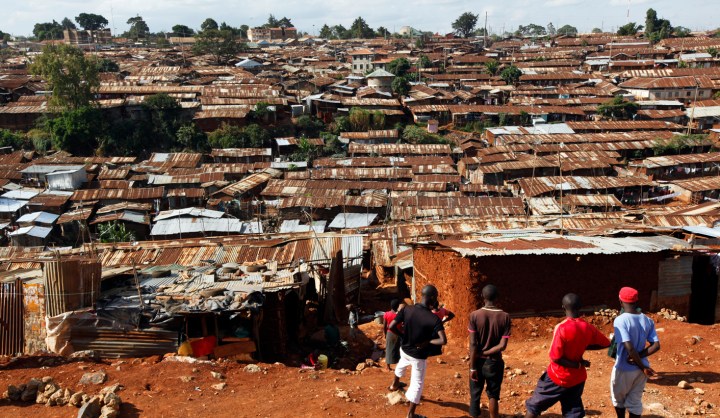Africa, Maverick Life
From Cairo to the Cape Flats: The Lion of Nairobi

There are generally two responses when we tell people that we've quit our jobs to travel across Africa from Cairo to Cape Town. Some folks are excited and even inspired to do the same. Others just shake their heads. As we make our way home to the Cape Flats over nearly 100 days, the following stories capture some of our wonderful adventures. By FARZANA PALEKER & KAYUM AHMED.
“Everything you’re about to see is real; nothing is pretence,” Lion proclaims as all three of us squeeze onto his motorcycle. We’re not sure whether this man with flowing dreadlocks, who resembles his namesake, is simply introducing us to a unique boda-boda experience or whether this is his version of a legal disclaimer.
“How did the motorcycle drivers in Nairobi get the name ‘boda-boda’?” we ask as Lion weaves through the traffic. A truck suddenly changes lanes in front of us, puffing black smoke into the air. It cuts off a bright green hooting matatu, the Kenyan equivalent of a minibus taxi, filled with commuters. We are completely exposed to the elements on the back of Lion’s motorcycle. As he manoeuvres around the truck, the two of us cling to him, each other and bits of the bike in order to avoid knocking into other vehicles, people and livestock swarming the streets of Nairobi on this busy Saturday afternoon.

Photo: Three of us on Bike in Nairobi. (Kayum Ahmed)
Three people on one motorcycle driving through Nairobi traffic is dangerously stupid and exhilarating at the same time. Lion navigates his bike through the madness, at times over pedestrian-filled pavements until we reach our first stop. We settle down at his regular lunch spot – a makeshift cafe on the side of the road. A chicken scuttles under our table, enjoying its last clucking hours before it becomes dinner. The locals stare openly at us while Lion shares his views on everything from politics to religion. Here he explains that the term boda-boda is derived from “border-border” – a title given to drivers who ferried goods between the Kenyan and Tanzanian border. Today, boda-bodas are motorcycle drivers who transport goods and people across the city.

Photo: Lion (Kayum Ahmed)
It’s two days after the horrific murder of 147 students at the Garissa University by Somali extremists, Al-Shabaab. We are warned not to visit Eastleigh so soon after the attacks, since the police are likely to raid the area. But having recently completed Jonny Steinberg’s book on the journey of a Somali refugee from Mogadishu to Cape Town, we are eager to see the neighbourhood where Asad, the subject of Steinberg’s book, spent so much time.
Lion is also happy to take us to Eastleigh, since this is where his mira dealer is located. He stops to buy a small bag of the stimulant, a green leaf like the “chat” found in Ethiopia. Lion explains that the softest leaves must be chewed with berry flavoured chewing gum for a few minutes. “This will make you feel like a powerful man but it’s too bad the feeling doesn’t last forever,” he chuckles.
Travelling through Eastleigh, we are reminded of Asad’s journey across the continent as a Somali refugee, compellingly captured in Steinberg’s book. Asad is treated badly in every country he travels through as an illegal immigrant, but it is only in South Africa that his neighbours try to murder him.
A few weeks later, we hear about the latest xenophobic attacks back home, following our trek up Mount Kilimanjaro. We had proudly listed our nationality in the climbers’ register as we traversed the highest mountain in Africa. After our descent we watch the news in horror, overcome by nausea and light-headedness, reminiscent of the altitude sickness we experienced at Uhuru peak.

Photo: Kili (Kayum Ahmed)
We are reminded of an encounter where young Kenyan men cried out “Mzungu!” as we drove through Kibera, Africa’s largest slum, clinging onto the back of Lion’s motorcycle. “Mzungu,” a term that was being directed at us, is the Swahili word for white people specifically, and foreigners more generally. We would never be mistaken for white people or foreigners in South Africa. And yet many of the people we meet during our journey look at us sceptically when we tell them where our home is.
Our anecdotal encounters as privileged tourists across the continent suggest that South Africans are often chastised for failing to embrace our African identity, other African countries, particularly in the North, and also struggle to make sense of their geographical umbilical cord. But the significant difference, of course, is the violence that some foreigners encounter in South Africa. We are reminded of this by several locals in many of the countries we travel through, despite our attempts to provide context and balance.
We struggle to reconcile the South Africa that we know and love, the country that forms the basis of our identity, a place that not too long ago accepted our immigrant grandparents, with the South Africa that is killing foreigners. On the back of Lion’s motorcycle, life appears simpler. Driving in the direction of oncoming traffic, then over a pavement with pools of muddy water, Lion squeezes through two lines of thick traffic until we reach the open road. Notably affronted by the taunting we experience in Kibera, he indicates that these same men would not take kindly to us shouting “Hey black people!” while passing them by on the streets of Nairobi.
“How can they call you Mzungu?” he roars above the revving of his motorcycle. Adding, much to our amusement, “Can’t they see that you’re Indian?” DM
Farzana Paleker is a specialist dentist with an interest in bioethics and health law. Kayum Ahmed is her devoted husband and the executive director of HumanRights.org.za. Follow their journey on Instagram: #CairoToCapeFlats
Main Photo: The Kibera slum, Nairobi, Kenya, 07 March 2013. EPA/DAI KUROKAWA
















 Become an Insider
Become an Insider